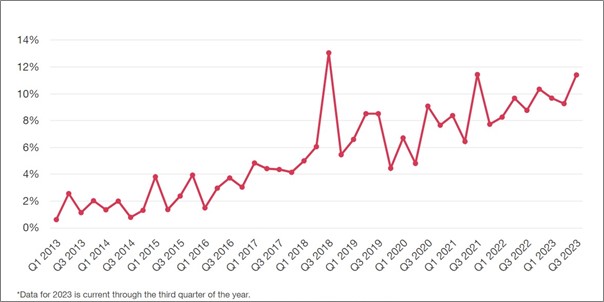Climate Change Mitigation Presents Growing Career Opportunities

For young people concerned about environment, it is personally meaningful that the drive toward a decarbonised economy provides chances to pursue one’s career while working toward climate solutions
The worsening climate crisis and rapid growth of clean technologies are creating many new career opportunities. A PwC report finds that climate tech’s share of private market equity and grant investment rose to 11.4% in Q3 2023 and is tracking at an annual rate of 10% for the year to date, extending a decade-long upward trajectory. The IEA projects that 2023 will see US$1.7 trillion go towards deploying renewables, grids and other clean-energy technologies – a new record high following six consecutive years of increases. As companies invest more in sustainability, compliance reporting, and decarbonisation efforts, there will be increasing demand for skills in these areas.

Image: Climate tech investment as a percentage of venture capital and private equity investment (2013 – 2023); Source: Pitchbook, PwC Analysis
High demand for sustainability managers
Positions in sustainability, such as sustainability managers and reporting analysts, will be in high demand to help companies meet new regulations and transparency requirements. The complexity of reporting means companies may need to devote as many resources to it as they do to financial reporting. This could lead to major growth in sustainability departments and consulting firms focused on helping companies comply.
The cleantech industry also presents many opportunities as renewable energy capacity expands dramatically worldwide. Jobs in sectors like solar, wind, electric vehicles, batteries, smart grids, and energy efficiency are likely to see strong growth. Whether you’re an engineer, project manager, construction worker, electrician, or sales professional, cleantech offers exciting new possibilities.
440 gigawatts of renewable energy added in 2023
The International Energy Agency estimated that in 2023, the world added a stunning 440 gigawatts of renewable capacity – more than all of the electric capacity of Germany and Spain combined. China alone added more solar than the existing solar capacity in the U.S. This rapid expansion is being driven partly by aggressive policy (like the Inflation Reduction Act in the U.S.). But even if political winds shift, the real momentum now is economics: Renewables are cheaper in most places, so the expansion will continue. Multitrillion-dollar markets are in play.
Some parts of the transition might face headwinds, such as the solar sector contending with inflation and supply chain issues. But no industry buildout is a straight line, and the train has left the station on clean energy, electric vehicles, smart grids, building efficiency, and more. The transition is inevitable, which even the oil-drenched climate meeting (COP28, held in December in Dubai) agreed to with its final commitment to “transition away” from fossil fuels.
Even the fossil fuel industry recognises the inevitability of the clean energy transition, as evident in commitments made at recent climate meetings. While the sector will shrink over time, in the near-term oil and gas companies still need help managing this change. This could mean opportunities in areas like helping reshape business strategies or repurposing infrastructure for renewable energy.
Energy employment rose to 67m
Per the International Energy Agency global energy employment rose to 67 million people in 2022, an increase of 3.5 million from pre-pandemic levels. More than half of employment growth over this period was in just five sectors: solar PV, wind, electric vehicles (EVs) and batteries, heat pumps, and critical minerals mining. Of the five sectors, solar PV is by far the largest employer, accounting for 4 million jobs, while EVs and batteries were the fastest growing, adding well over 1 million jobs since 2019.
Skilled labour shortage
However, a growing number of energy industries are citing skilled labour shortages as a key barrier to ramping up activity, according to a proprietary survey carried out by the IEA with 160 energy firms globally. The report finds the number of workers pursuing degrees or certifications relevant to energy sector jobs is not keeping pace with growing demand. This is particularly the case for vocational workers like electricians specialised for energy-sector work, as well as professionals in science, technology and engineering.
Positions focused on climate change mitigation strategies, sustainability management, compliance reporting, and renewable energy industries should see sizable growth in the coming years. Young people concerned about the environment may find these fields personally meaningful while benefiting from increasing labour demand. The drive toward a decarbonised economy provides chances to pursue your career while working toward climate solutions.


